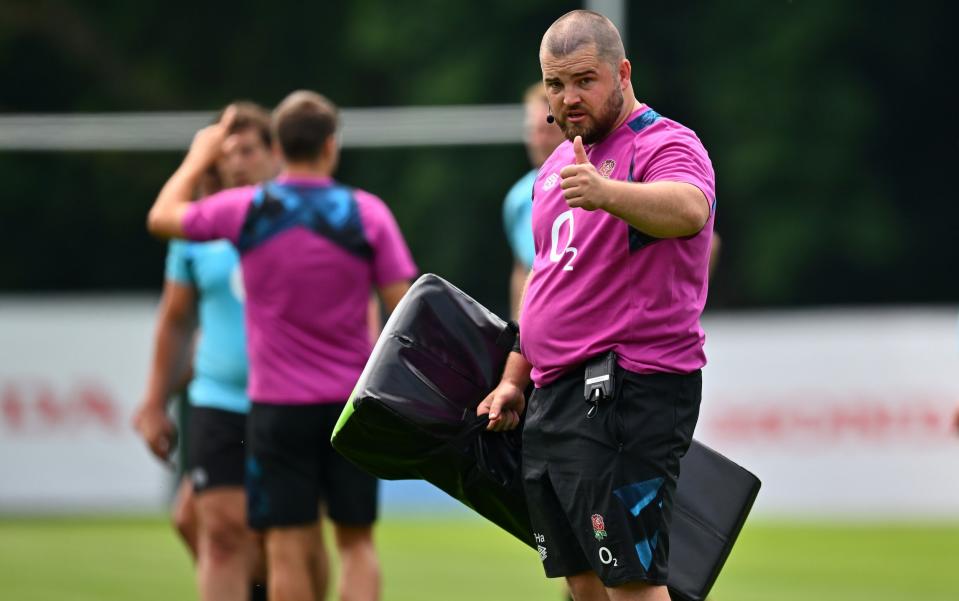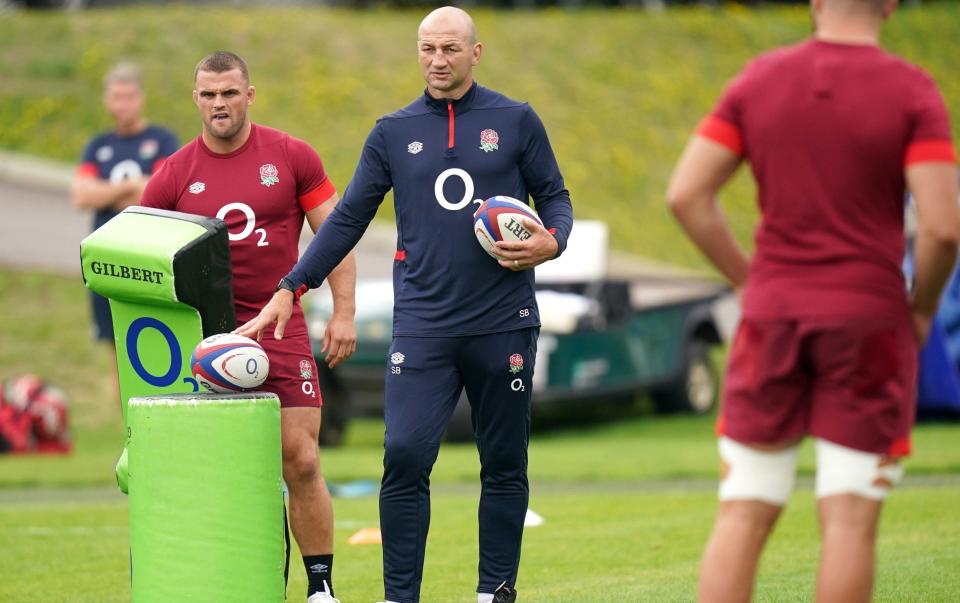Tom Harrison: ‘My dyslexia helps me fix England’s scrum problems’

Tom Harrison may have taken the road less travelled to reach the top of rugby union, but those paths tend to be the most fascinating. Having battled with dyslexia and attended what sounds like an unofficial scrum university in the French second division during his playing days, the new England scrum coach is more interesting than most assistant coaches.
Harrison, at the age of 31, is young enough to have been at Hartpury College at the same time as England forwards Ellis Genge and Jonny Hill. Not that youth should be confused with inexperience. Coaching since 2012, including six years at Leicester Tigers capped off by winning the Gallagher Premiership title in 2022, Harrison is no rookie. As pointed out by Lewis Ludlam, the Northampton and England flanker, he offers something different to the usual relationship between coaches and players.
“Having a young head who we can socialise and connect with as well has been really good. There’s a two-way relationship there which is quite nice to have,” says Ludlam.
Harrison’s connection with England head coach Steve Borthwick in fact goes back a couple of decades. Harrison’s father, John, was team manager at first Bath and then Bristol. Tom spent his childhood, when not at Beechen Cliff School, watching Borthwick captain Bath at The Rec. More importantly he also spent that time reading something of interest which could help with his dyslexia; matchday programmes.
“I had an English teacher, Mr Morris, and my parents were a bit concerned that all I used to read were the programmes. Mr Morris told them ‘it’s brilliant, you have found something that he’s invested in reading’. And that fuelled my love for rugby,” Harrison explains.
”[The dyslexia] is almost like you’re in a 100-metre race, but your lane has hurdles in it. Over the course of growing up I have learned different ways of thinking, someone called it cognitive diversity. Sometimes they are brilliant ideas, sometimes they’re horrendous, but I probably think slightly outside the box to different people. I see that as a problem-solving tool, it can be very beneficial.” He adds with a smile: “I’m not the biggest fan of writing on a whiteboard, put it that way. And people probably can’t read my notes”.
Life with Auch - Antoine Dupont’s first club - in the south of France required less paperwork and more mental resilience. Team-mates who spoke English would translate messages to Harrison from the club’s coaches about his scrummaging technique during sessions where the pack would hit the scrum machine a hundred times.
Tao Tapasu, then a 40-year-old lock scrummaging behind Harrison, might not have been much of a mover around the field and was unlikely to be found jumping in the line-out. “It didn’t matter - he loved pushing in the scrum, so he was playing,” Harrison recalls. “The town had a phrase, ‘no scrum, no win’ - ‘pas de mêlée, pas de victoire’. It was all we ever spoke about, all the crowd ever spoke about. Drums going at the start of the scrum, ‘bang, bang, bang’. Sometimes I think they didn’t even care if we won or lost [the game], as long as we won the scrum. It honed and fostered a love for scrummaging.”
Harrison left France and played for Plymouth in the Championship before his full-time coaching career took off, with a stop at Loughborough College followed by joining Leicester’s academy coaching team, winning three successive Under-18 League titles and then the Premiership.
Borthwick noted after losing his first game as head coach against Scotland that England’s scrum had been previously ranked as “the worst scrum in tier-one rugby”, while stressing in his opening press conference that making England’s foundations strong again was essential. Harrison’s task therefore as scrum coach is significant.

Carl Hayman, Marcos Ayerza and Jason Leonard are all name-checked by Harrison as scrummaging inspirations and when asked for his approach to the set-piece, he explains: “The scrum is no longer a restart of the game - it’s a pressure builder. Whether you build pressure by striking off it with fast ball so you can attack, or through winning a penalty. It’s a momentum swinger. If you win a turnover at the scrum, you see the backs celebrating. You have the ball, you have changed the momentum of the game.
“And the final part is the scrum is a fatigue generator. If you can keep scrummaging long and get the lactic acid building up in your legs, then players find it hard to run. You have a tight-five forward who is out of shape in defence, with players like Marcus [Smith], George [Ford] and Owen [Farrell] who can pick them off. Your scrum has had that effect on the game. If you can have those aspects and a strong, ruthless scrum, then you can really control a game of rugby.
“There are times where you see scrums that are reckless. ‘We are going to destroy you and that’s what we’re going to do’, where they then get over aroused. One scrum they might smash it, but the next they will concede a silly penalty. It’s having that mindset to be ruthless, but also to be smart.”
Nine players in the England squad are older than Harrison and three happen to be in the front row. He has happily embraced all of the experience on offer from Dan Cole, Joe Marler and Jamie George.
Fascinating as his time in France and mastering of his dyslexia certainly are, so is Harrison’s motivation, his drive, the reason behind his rapid ascent to the top of the coaching game.
“You talk about regrets, I probably didn’t take enough accountability myself as a player to achieve what I could have,” he admits. “There’s a difference between being a full-time rugby player and a professional rugby player. That has only started to click now as a coach, looking back.
“Did I maximise my opportunity? Probably not. One of my things as a professional coach now is, how do I maximise every opportunity to be the best I can be.” A realisation that came too late for Harrison’s playing career, but one that can now help England improve in a vital area of the game.

 Yahoo Sport
Yahoo Sport 



































































